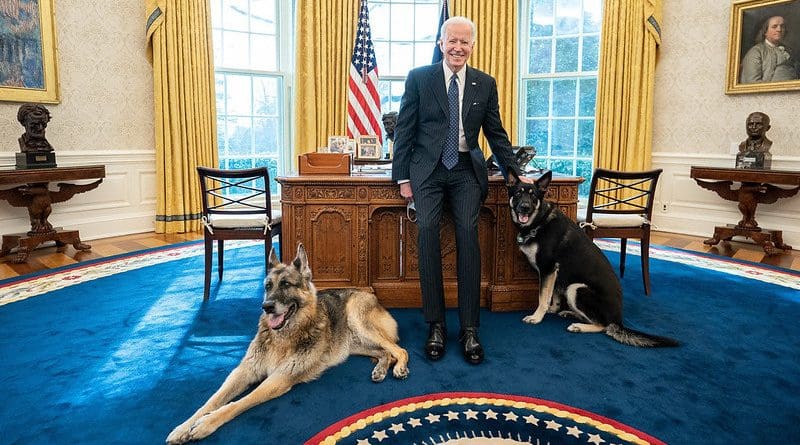Why Biden’s Eyes Are On Foreign Prizes – OpEd
By Arab News
By Andrew Hammond*
Joe Biden’s laser-like focus on domestic policy has yielded his first big win with a $1.9 trillion pandemic stimulus, but his presidency could yet be remembered more for its foreign policy legacy.
For now, however, Biden’s super priority is home affairs, and last week he gave his first prime time television address to the nation. With the pandemic now past its peak in the US, the president indicated his ambition that July 4 will bring “independence” from the health emergency after mass vaccinations.
Another reason Biden’s first 100 days are so focused on domestic policy is his awareness that there may only be a narrow window of opportunity’to secure his home agenda. The Democrats may lose a significant number of seats in Congress in next year’s mid-term elections, after which it is plausible he could face hostile Republican majorities in both the Senate and House of Representatives.
Since 1900, there have been only three midterm elections — 1934, 1998, and 2002 — in which the incumbent president’s party didn’t lose seats in the House. In the postwar era, there has been an average net loss of 26 House seats for the president’s party.
If this scenario does unfold in 2022, it will repeat recent history, when the incumbent’s first two years are the most productive in domestic policy. It is during this initial period in the White House that presidents usually succeed in enacting core priorities, as Donald Trump did, for instance, with his 2017 tax cut package.
This was also true for Barack Obama, George W. Bush, and Bill Clinton. Clinton secured a 1993 deficit reduction plan and passage of the North America Free Trade Agreement (NAFTA), Bush had his 2001 tax cuts, and Obama’s wins included a big 2009 stimulus package and healthcare reform.
So this is why Biden is zeroing in now on rejuvenating, post-pandemic, the US economy, society, and polity. Building from the coronavirus crisis stimulus victory last week, he has other priority legislation to secure in coming months, plus the wider objective of bringing greater reconciliation to the US body politic after the polarisation of Trump’s presidency.
To be sure, it is plausible that Biden may achieve further domestic policy success beyond his first two years in office. However, other recent presidents have found it difficult to gain momentum after this point.
In part, this is because they have held a weaker position in Congress over time. For instance, both Clinton in 1994 and Obama in 2010 suffered gains by the Republicans, who picked up the House from Democrats in both these mid-term ballots, and also the Senate in 1994.
Over time, Biden, like these other recent presidents, is therefore increasingly turning to foreign policy. Not only does he have a packed agenda on this front, but he is also is perhaps the most experienced and knowledgeable new president on international affairs in modern US history, and wants this to be a key part of his legacy.
Of course, experience does not equal success, but it should allow Biden to hit the ground running, which could be critical. A number of burning issues require immediate attention, beyond the pandemic which will already consume much of his time in the next four years.
Biden is not alone in wanting foreign policy initiatives to be a critical part of their legacy. Richard Nixon scored a string of international successes in his second two years of office from 1971 to 1973.
This included his landmark meeting with Chairman Mao in China in February 1972 before signing two nuclear agreements with Moscow to limit nuclear weapons. More recently, Bush sought to spread his self-proclaimed freedom agenda after the 2001 terrorist attacks, not least with the wars in Iraq and Afghanistan.
For Biden, key opportunities on the foreign policy front include rebuilding US alliances after the Trump presidency. From Europe to Asia-Pacific, longstanding allies emerged bruised from the past four years and are looking to the president to restore a more stable, predictable style of US leadership in the face of significant challenges to the international order from states such as China and Russia.
Climate change is another area where Biden sees scope for a strong legacy. Not only has the US rejoined the Paris climate treaty, but he also wants to make major new advances on this agenda, including nations committing to much deeper cuts in greenhouse gas emissions at the UK-hosted annual climate change conference in November.
This is why Biden is increasingly likely to turn to the world stage as his presidency advances. Not only is the steam likely to be lost from his domestic agenda, but there are also significant potential foreign policy prizes on the horizon before 2025.
• Andrew Hammond is an Associate at LSE IDEAS at the London School of Economics

